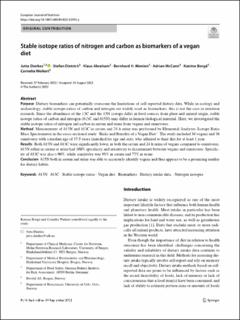Stable isotope ratios of nitrogen and carbon as biomarkers of a vegan diet
Dierkes, Jutta; Dietrich, Stefan; Abraham, Klaus; Monien, Bernhard H.; McCann, Adrian; Borgå, Katrine; Weikert, Cornelia
Journal article, Peer reviewed
Published version

Åpne
Permanent lenke
https://hdl.handle.net/11250/3030482Utgivelsesdato
2022Metadata
Vis full innførselSamlinger
- Department of Clinical Medicine [2066]
- Registrations from Cristin [9791]
Sammendrag
Purpose
Dietary biomarkers can potentially overcome the limitations of self-reported dietary data. While in ecology and archaeology, stable isotope ratios of carbon and nitrogen are widely used as biomarkers, this is not the case in nutrition research. Since the abundance of the 13C and the 15N isotope differ in food sources from plant and animal origin, stable isotope ratios of carbon and nitrogen (δ13C and δ15N) may differ in human biological material. Here, we investigated the stable isotope ratios of nitrogen and carbon in serum and urine from vegans and omnivores.
Method
Measurement of δ15N and δ13C in serum and 24 h urine was performed by Elemental Analyzer–Isotope Ratio Mass Spectrometer in the cross-sectional study “Risks and Benefits of a Vegan Diet”. The study included 36 vegans and 36 omnivores with a median age of 37.5 years (matched for age and sex), who adhered to their diet for at least 1 year.
Results
Both δ15N and δ13C were significantly lower in both the serum and 24 h urine of vegans compared to omnivores. δ15N either in serum or urine had 100% specificity and sensitivity to discriminate between vegans and omnivores. Specificity of δ13C was also > 90%, while sensitivity was 93% in serum and 77% in urine.
Conclusion
δ15N both in serum and urine was able to accurately identify vegans and thus appears to be a promising marker for dietary habits.
